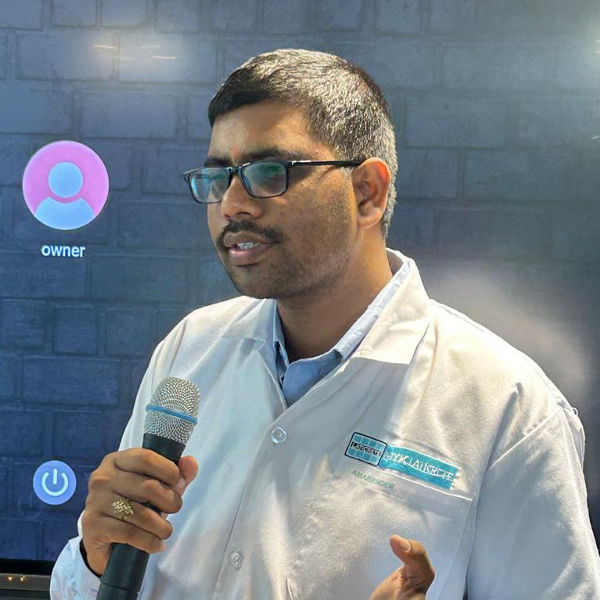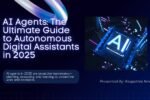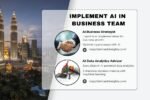AI isn’t just a term anymore; it’s altering schools, employment, and whole sectors. For students who follow the CBSE curriculum, understanding AI early on helps them think critically and solve problems. This CBSE AI Curriculum Overview provides a helpful, step-by-step guide to navigate the syllabus swiftly. By following this curriculum, students, teachers, and parents can ensure that learning is both effective and stress-free.
This guide provides a step-by-step approach to understanding the workings of the CBSE AI Curriculum 1.
1. Refer to the official CBSE AI syllabus for your grade.

Image Source: CBSE AI Syllabus Interface
This picture shows the official CBSE AI syllabus interface. It gives students a general idea of the subjects, modules, and what they will learn. Teachers and students may quickly find their way around the curriculum, keep track of their progress, and find resources. Using the central dashboard makes sure that students follow the right order and reach all of their learning goals. This picture helps you understand how CBSE AI education is organized.
Download the full CBSE AI syllabus PDF [Download CBSE AI Syllabus (Grade 10]
There are three elements to the curriculum: foundational AI concepts, real-world applications, and projects.
- For instance, Grade 9 may cover the basics of Python programming and how to solve issues, while Grade 10 might add AI tools and small machine learning projects.
- Don’t skip any pieces; each one builds on the one before it.
2. CBSE AI Curriculum Overview: Learn the Basics of AI
- Get to know the basics of AI, machine learning, and data.
- This entails knowing about algorithms, the distinction between supervised and unsupervised learning, and the different types of data.
- Using historical data to guess the weather is a simple example of supervised learning.
- Advanced Tip: Find online AI classes that allow you to learn by doing.
As you explore the CBSE AI curriculum, you might wonder how to study AI beyond school. For example, students can follow a structured self-study plan to learn Python, machine learning, and AI projects. Check out our complete guide here: Can I Learn AI on My Own? A Complete Guide to Self-Studying Artificial Intelligence
3. Find out how to code in Python.
- Action: Learn the basics of Python, such as variables, loops, functions, and lists.
- Python is the main language used in CBSE AI for coding tasks.
- For example, writing a Python script to sort a list of integers shows basic coding abilities.
- Don’t memorize code; instead, focus on grasping reasoning.
4. CBSE AI Curriculum Overview: Get Better at Handling Data
- Action: Use Python tools like Pandas and NumPy to work with datasets.
- CBSE AI focuses on gathering, cleansing, and presenting data.
- For instance, you could create a table of student scores and a bar chart using Python.
- For a visual suggestion, include a screenshot of a basic Pandas DataFrame and plot.
5. Look at AI tools and platforms.
- Action: Learn about the AI technologies that CBSE suggests.
- Tools for AI may be Google Colab, Jupyter Notebook, or Scratch.
- For example, you may run a simple ML model on Google Colab without having to install Python on your computer.
- Don’t only use GUI tools; learn how the code underlying actions works.
6. CBSE AI Curriculum Overview: Start Little AI Projects
- Action: Finish mini-projects according to the rules of the curriculum.
- Projects bring together theory and practice, which makes AI ideas easier to understand.
- For a basic question-and-answer assignment, create a chatbot in Python.
- Advanced Tip: To learn more, try changing projects using your ideas.
7. Understand the Rules of Ethical AI
- Do: Learn about AI ethics, privacy, and data security.
- CBSE wants people to use AI responsibly, with a focus on models that are safe and devoid of prejudice.
- For example, knowing why skewed datasets might make forecasts that aren’t fair.
- Don’t forget about ethics; even minor efforts might accidentally copy prejudice.
8. CBSE AI Curriculum Overview: Do Exercises That Help You Solve Problems
- Do: Solve AI logic and algorithmic difficulties.
- Exercises help you think logically, which is important for AI development.
- For example, you might use Python to find trends in data on student attendance.
- For clarification, you might add a flowchart that shows the processes for solving the problem.
9. Get better at visualizing data.
- Use Python or spreadsheet tools to make graphs and charts.
- Visualization is crucial for understanding AI predictions and showing what you found.
- For example, use a line graph to show how many hours of homework you did and what grades you got.
- Advanced Tip: Try Seaborn or Matplotlib for more advanced ways to show data.
10. Take part in group projects.
Do AI tasks or contests in groups.
- Teamwork helps people learn how to talk to each other, analyze critically, and solve problems in the real world.
- For example, use Python to build a project that predicts patterns in school attendance and share the work.
- Don’t take over the project; working together improves learning results.
11. CBSE AI Curriculum Overview: Make Changes Often
- Set aside time each week to go over what you’ve learned and practice coding.
- Consistent revision helps you remember things for a long time and gives you confidence in using AI talents.
- For example, set aside 30 minutes per weekend to go over old Python exercises.
- Advanced Tip: Keep a digital notepad for your thoughts and code snippets.
12. Get ready for tests.
- Action: Look at the question patterns and work on some example papers.
- Explanation: The CBSE tests check both your grasp of concepts and your ability to use them in real life.
- For example, try answering questions from last year about AI problem-solving and data analysis.
- Avoid last-minute cramming; consistent practice enhances your understanding of AI.
13. Think and come up with new ideas.
- Action: Think about what you’ve learned and come up with fresh ideas for AI projects.
- Reflection helps you find your talents, faults, and innovative ideas.
- For example, think about adding natural language processing capabilities after a chatbot project.
- Sophisticated Tip: For more sophisticated testing, look into open-source AI libraries.
Conclusion: Important Points to Remember
The CBSE AI curriculum combines theory, programming, and hands-on projects.
Following this list makes sure that you study in a systematic way, get hands-on experience, and comprehend ethics.
Don’t skimp on the basics or ethics. Instead, get involved with codes and projects.
Students will get better at AI and be ready for new technologies in the future by practicing, working together, and thinking about what they’ve learned.
Students and teachers may turn abstract AI ideas into useful knowledge by following these steps. This systematic method boosts confidence, creativity, and technical skills, giving students a solid base for studying more sophisticated AI.
Disclaimer: The CBSE AI syllabus screenshot is for illustrative and educational purposes only. All content and trademarks belong to the Central Board of Secondary Education (CBSE).
Last updated on August 31, 2025

Hi, I’m Amarender Akupathni — founder of Amrtech Insights and a tech enthusiast passionate about AI and innovation. With 10+ years in science and R&D, I simplify complex technologies to help others stay ahead in the digital era.



